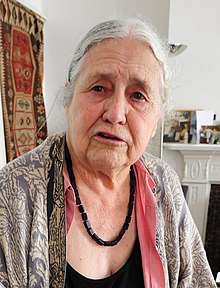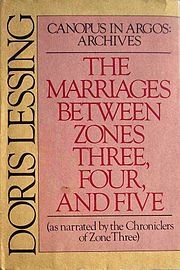| Doris Lessing | ||||
 "that epicist of the female experience, who with scepticism, fire and visionary power has subjected a divided civilisation to scrutiny." "that epicist of the female experience, who with scepticism, fire and visionary power has subjected a divided civilisation to scrutiny." | ||||
| Date |
| |||
| Location | Stockholm, Sweden | |||
| Presented by | Swedish Academy | |||
| First awarded | 1901 | |||
| Website | Official website | |||
| ||||
The 2007 Nobel Prize in Literature was awarded to the British novelist Doris Lessing (1919–2013) as "that epicist of the female experience, who with scepticism, fire and visionary power has subjected a divided civilisation to scrutiny." Lessing was the oldest person ever, at age 88, to receive the Nobel Prize in Literature followed by the German historian Theodor Mommsen, who received the prize at age 85. She is also the third-oldest Nobel laureate in any category (after Leonid Hurwicz and Raymond Davis Jr.). She became the 11th woman to be awarded the prize.
Laureate
Main article: Doris LessingDoris Lessing's body of work comprises around 50 books and spans several genres including The Grass Is Singing (1950), The Memoirs of a Survivor (1974), and The Sweetest Dream (2001). Her writing is characterized by penetrating studies of living conditions in the 20th century, behavioral patterns, and historical developments. Her most experimental novel, The Golden Notebook (1962) is a study of a woman's psyche and life situation, the lot of writers, sexuality, political ideas, and everyday life. Some of Lessing's books reach into the future and, among other things, she portrays our civilization's final hour from the perspective of an extraterrestrial observer such as the Canopus in Argos Series (1979–83). She has also written autobiographical accounts of her life and numerous memoirs like Under My Skin: Volume One of My Autobiography, to 1949 (1994) and Alfred and Emily (2008).

Deliberations
Lessing had been considered by the Nobel committee for many years. In 1974 she was shortlisted for a shared prize with Nadine Gordimer (awarded in 1991).
Reactions
Lessing was out shopping for groceries when the Nobel Prize announcement came. Arriving home to a gathering of reporters, she exclaimed, "Oh Christ!" "I've won all the prizes in Europe, every bloody one, so I'm delighted to win them all. It's a royal flush."
Her longtime agent, Jonathan Clowes, was delighted at the news of the award he said, "was very well-deserved". Speaking to Reuters, her editor at Fourth Estate, Nicholas Pearson, called it "thrilling" and claimed that her early books "changed the face of literature through the description of the inner lives of women". Jane Friedman, chief executive of HarperCollins (of which Fourth Estate is a division), described her as "an icon for women". Lessing called winning the Nobel Prize "a disaster" for her writing, but her friends say the money which came with the prize helped ease her final years, spent, by her own account, giving interviews and caring for her invalid son.
Nobel lecture
She entitled her Nobel Lecture On Not Winning the Nobel Prize and used it to draw attention to global inequality of opportunity and to suggest that fiction writers can be involved in redressing those inequalities. Lessing wrote that "it is our imaginations which shape us, keep us, create us – for good and for ill. It is our stories that will recreate us, when we are torn, hurt, even destroyed." The lecture was later published in a limited edition to raise money for children made vulnerable by HIV/AIDS. In a 2008 interview for the BBC's Front Row she stated that increased media interest after the award had left her without time or energy for writing. Her final book, Alfred and Emily, appeared in 2008.
In 2017, just 10 years later, her Nobel medal was put up for auction. Previously only one Nobel medal for literature had been sold at auction, for André Gide in 2016.
References
- The Nobel Prize in Literature 2007 nobelprize.org
- ^ Crown, Sarah (11 October 2007). "Doris Lessing wins Nobel prize". The Guardian. Retrieved 18 March 2022.
- Editors at BBC. "Author Lessing wins Nobel honour", BBC News, 23 October 2007. Retrieved 12 October 2007.
- Marchand, Philip. "Doris Lessing oldest to win literature award". Toronto Star, 12 October 2007. Retrieved 13 October 2007.
- Hurwicz won the Nobel Memorial Prize in Economic Science in 2007 aged 90. Davis received the 2002 Physics Prize at 88 years 57 days. Their birth dates are shown in their biographies at the Nobel Prize web site, which states that the awards are given annually on 10 December.
- Pierre-Henry Deshayes. "Doris Lessing wins Nobel Literature Prize". Herald Sun. Retrieved 16 October 2007.
- Reynolds, Nigel. "Doris Lessing wins Nobel prize for literature". The Telegraph. Retrieved 15 October 2007.
- Doris Lessing – Facts nobelprize.org
- Doris Lessing britannica.com
- "Sekretessen lyfts om priset "som förstörde allt"" (in Swedish). Aftonbladet. 2 January 2025.
- "Lessing's Legacy of Political Literature", CBS News, 12 October 2007.
- Hinckley, David. "Doris Lessing wins Nobel Prize for Literature". Daily News (New York). Retrieved 15 October 2007.
- ^ Vicki Barker (17 November 2013). "How Writer Doris Lessing Didn't Want To Be Remembered". npr.org. Retrieved 21 May 2021.
- ^ "Lessing: Nobel win a 'disaster'". BBC News. 11 May 2008. Retrieved 11 May 2008.
- "The Nobel Prize in Literature 2007". NobelPrize.org. Retrieved 24 April 2019.
- "Valuable Books and Manuscripts". Christies. 13 December 2017. Retrieved 7 December 2017.
- ^ Alison Flood (7 December 2017). "Doris Lessing's Nobel medal goes up for auction". The Guardian. Retrieved 7 December 2017.
External links
- Prize announcement 2007 nobelprize.org
- Award Ceremony nobelprize.org
- Award ceremony speech nobelprize.org
| 2007 Nobel Prize laureates | |
|---|---|
| Chemistry |
|
| Literature (2007) |
|
| Peace (2007) |
|
| Physics |
|
| Physiology or Medicine |
|
| Economic Sciences |
|
